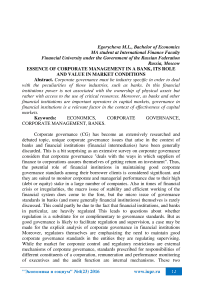Essence of corporate management in a bank, its role and value in market conditions
Автор: Egorycheva M.L.
Журнал: Экономика и социум @ekonomika-socium
Статья в выпуске: 4-1 (23), 2016 года.
Бесплатный доступ
Corporate governance must be industry specific in order to deal with the peculiarities of those industries, such as banks. In this financial institutions power is not associated with the ownership of physical assets but rather with access to the use of critical resources. Moreover, as banks and other financial institutions are important operators in capital markets, governance in financial institutions is a relevant factor in the context of effectiveness of capital markets.
Economics, corporate governance, corporate management, banks
Короткий адрес: https://sciup.org/140118979
IDR: 140118979
Текст научной статьи Essence of corporate management in a bank, its role and value in market conditions
CORPORATE MANAGEMENT, BANKS.
Corporate governance (CG) has become an extensively researched and debated topic, unique corporate governance issues that arise in the context of banks and financial institutions (financial intermediaries) have been generally discarded. This is a bit surprising as an extensive survey on corporate governance considers that corporate governance "deals with the ways in which suppliers of finance to corporations assures themselves of getting return on investment". Thus, the potential role of financial institutions in maintaining good corporate governance standards among their borrower clients is considered significant. and they are suited to monitor corporate and managerial performance due to their high (debt or equity) stake in a large number of companies. Also in times of financial crisis or irregularities, the macro issue of stability and efficient working of the financial system does come to the fore, but the micro issue of governance standards in banks (and more generally financial institutions) themselves is rarely discussed. This could partly be due to the fact that financial institutions, and banks in particular, are heavily regulated This leads to questions about whether regulation is a substitute for or complimentary to governance standards. But as good governance is likely to facilitate regulation and supervision, a case may be made for the explicit analysis of corporate governance in financial institutions Moreover, regulators themselves are emphasizing the need to maintain good corporate governance standards in the entities they are regulating supervising. While the market for corporate control and regulatory restrictions are external mechanisms of corporate governance, standards prescribed for responsibilities of different constituents of a corporation, remuneration and performance monitoring of executives and the audit function are internal mechanisms. These two mechanisms are likely to be complementary.
It has been argued that corporate governance mechanisms would be country specific as they would depend on the development of financial systems and funding requirements of the industrial sector. Another related and interesting issue could be whether corporate governance is industry specific. While there are several corporate governance issues that are common between financial institutions and banks, relationship between shareholders and the board of directors, division of responsibilities between board and management, role of audit committees, there are several reasons which would justify separate treatment of CG issues in financial institutions.
Some researchers list the predominance of depositors who have a fixed claim (vis-a-vis shareholders) moral hazards inherent in banking leading to agency costs and the fear of bank runs, as the reasons for the importance of CG in banks. Another reseachers highlight the unintended effects of deposit insurance on the risk tolerance of bank managers. It has also been argued that in the 'new' businesses (such as banks or software companies) where human capital and not physical assets are important, not ownership but access to critical resources becomes important. Hence new governance mechanisms would be required in such enterprises.
Certain governance issues are peculiar to financial institutions and therefore different mechanisms would be necessary to maintain good governance standards. While regulators and supervisory authorities seek to maintain stability of the financial system, other mechanisms that focus on the working of individual institutions, play a complemetary role and reduce the regulatory burden on regulatory/supervisory authorities could be useful. Governance in financial institutions is an important micro aspect of the working of financial institutions. The question of corporate governance would also be important in the context of the relative efficacy of bank based and market financial systems. Corporate governance norms become important because the market for corporate control is not always effective. Similarly, competition in product markets may keep management on its toes but it cannot become a substitute for good corporate governance. Moreover, as banks and other financial institutions are important operators in capital markets, governance in financial institutions is a relevant factor in the context of effectiveness of capital markets.
Resources:
-
1. Liu Lawrence, ‘Corporate Governance for Financial Institutions'
-
2. Jalan Bimal, 'Corporate Governance and Financial System: Some Issues'
-
3. Масeу J R and O'Hara M, 'The Corporate Governance of Banks'
"Экономика и социум" №4(23) 2016
Список литературы Essence of corporate management in a bank, its role and value in market conditions
- Liu Lawrence, ‘Corporate Governance for Financial Institutions'
- Jalan Bimal, 'Corporate Governance and Financial System: Some Issues'
- Масeу J R and O'Hara M, 'The Corporate Governance of Banks'


